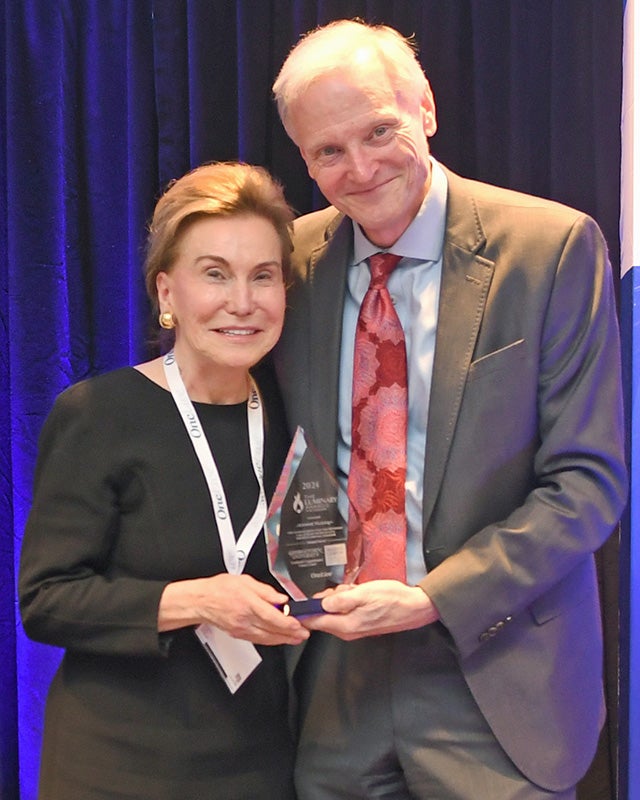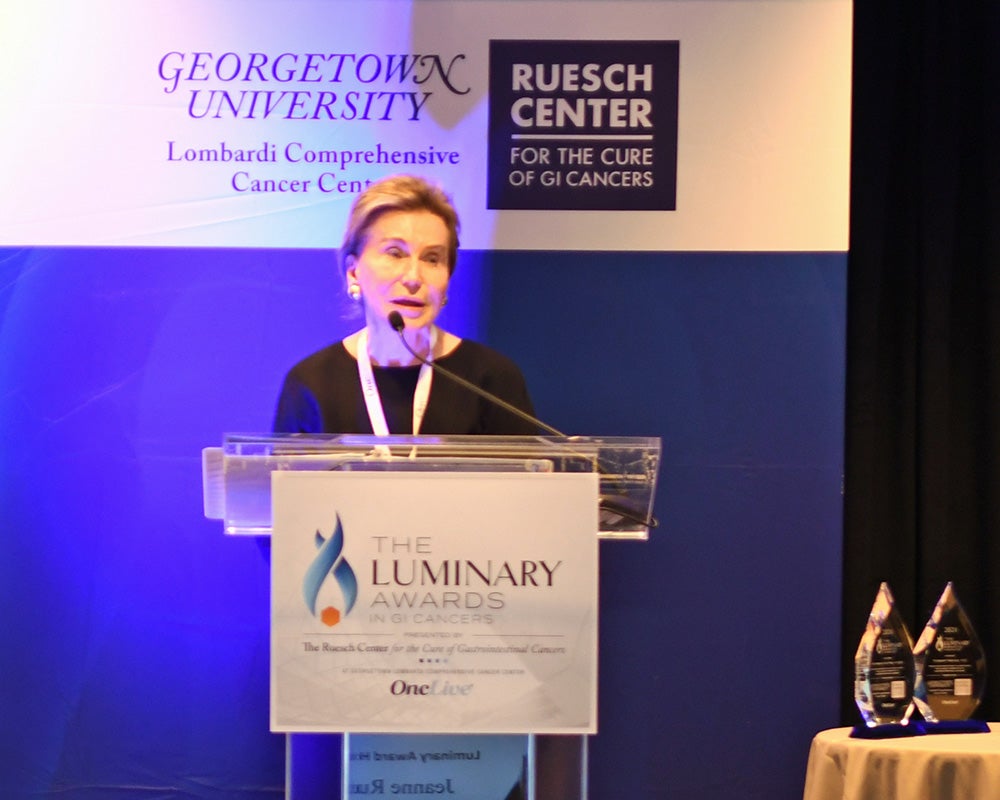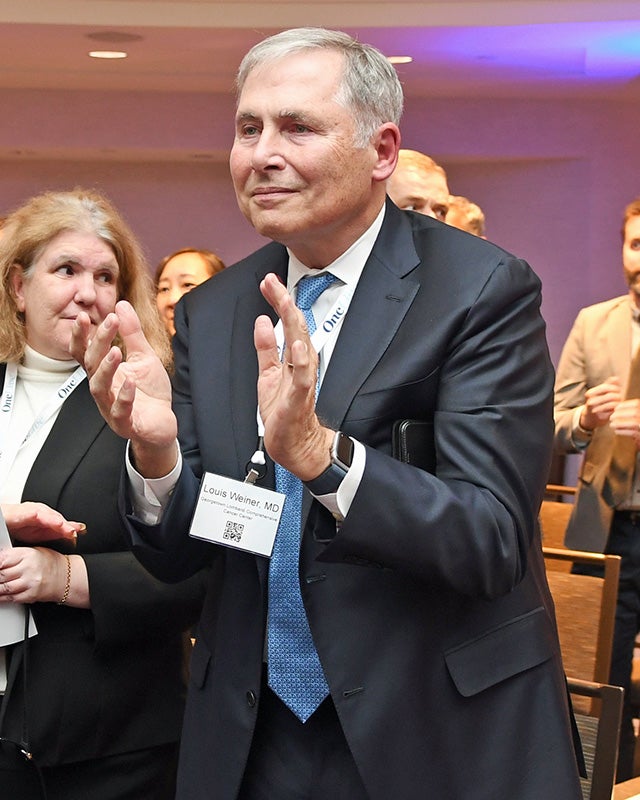Celebrating Its 15th Anniversary, Ruesch Center Honors Founder

Posted in Lombardi Stories | Tagged Luminary Awards, Ruesch Center, Ruesch Center Symposium
(November 26, 2024) — Since its establishment in September 2009, the Otto J. Ruesch Center for the Cure of Gastrointestinal (GI) Cancers at Georgetown’s Lombardi Comprehensive Cancer Center has been dedicated to advancing transformative research to save lives. At the Luminary Awards in GI Cancer, attendees honored the countless contributions of Jeanne Ruesch, chair of the Ruesch Family Foundation and founder of the Ruesch Center.

As the kickoff event for the Ruesch Center’s annual symposium, held November 22-23 at The Westin Georgetown, the Luminary Awards recognize accomplished individuals for their lifetime achievements focused on finding cures for and improving the lives of those affected by GI cancer.
“I’ve had the privilege of getting to know Jeanne Ruesch over the years,” said Louis Weiner, MD, director of Georgetown Lombardi. “Her visionary investment in the Ruesch Center for the Cure of Gastrointestinal Cancers transformed the work we do at Georgetown and continues to transform the work we do at Georgetown.”
The November 21 Luminary Awards at The Westin Georgetown also honored:
- Anirban Maitra, MBBS, professor of pathology and translational molecular pathology, and scientific director of the Sheikh Ahmed Bin Zayed Al Nahyan Center for Pancreatic Cancer Research at the University of Texas MD Anderson Cancer Center;
- Robert Mayer, MD, faculty vice president for academic affairs at the Dana Farber Cancer Institute, senior physician at Brigham and Women’s Hospital and the Stephen B. Kay Professor of Medicine and faculty associate dean for admissions at Harvard Medical School;
- Lee Smith, MD, professor of surgery (retired) at MedStar Washington Hospital Center;
- Robert Wender, MD, Robert G. Dunlop Professor and Chair of the Department of Family Medicine and Community Health at the Perelman School of Medicine, University of Pennsylvania
High Risk, High Reward Research

In 2003, John Marshall, MD, director of the Ruesch Center and professor of oncology and Medicine at Georgetown, met a new patient and his wife — Otto Ruesch, a prominent Washington-area businessman and philanthropist diagnosed with pancreatic cancer, and Jeanne.
Otto fought cancer for 14 months before his death in October 2004. Over that time, the Ruesches were shocked to learn about the bleak prognosis for people with GI cancer. “When I got started, the average survival of patients with metastatic colon cancer was around 11 months, pancreatic cancer was about four months,” Weiner said. “It was horrible.”
The Ruesches saw the need for research funding to treat GI cancer specifically, and advocacy to increase awareness. In Otto’s memory, Jeanne established the Ruesch Center with Marshall as its director, encouraging him to focus on high-risk, high-reward research to make significant strides in the fight against GI cancers.
“I was a young guy and I had big ideas, and she’s the one who said, ‘You’ve got to do it the right way,’” said Marshall, who is also clinical director of oncology and chief of the division of hematology/oncology at MedStar Georgetown University Hospital. “Without that solid base, that guidance, that focus for the future, I think we wouldn’t be having a 15th anniversary of the Ruesch Center.”
‘The Future Has Never Looked Brighter’
Standard chemotherapy regimens are ineffective for the majority of GI cancer patients. Over the last 15 years, researchers at the Ruesch Center have improved their understanding of the genetic mutations that drive the development of cancer and identified targeted treatments for specific tumor types.

The advent of immunotherapy has improved outcomes for many cancer patients, but not those who have been diagnosed with pancreatic cancer, which was one of the topics covered by the 2024 Ruesch Center symposium. However, following promising preclinical studies, researchers supported by the Ruesch Center led a phase 2 clinical trial to see how tumors responded to a treatment combining immunotherapy with an experimental drug called an immune activator.
Based on outcomes from the first six clinical trial participants, the progression-free survival rate as determined by imaging was 50%, according to Benjamin Adam Weinberg, MD, the clinical trial’s lead investigator and a Ruesch Center member. Three patients experienced significant reductions in a biomarker that indicates the presence of pancreatic cancer.
“Historically, no one has responded to immunotherapy in pancreatic cancer, so even one response and another with stable disease could be early signs of efficacy,” said Weinberg, who is also an associate professor of medicine at Georgetown University School of Medicine. He presented findings from the trial at the American Society of Clinical Oncology meeting in June 2024.
Such innovative clinical trials provide opportunities for patients to access the latest therapies, and nurse navigators have supported more than 2,800 patients through the cancer treatment process. In addition, the Ruesch Center summer program for students helps train future leaders in cancer research.
“I am so lucky to work in what has become a GI cancer powerhouse,” Marshall said. “Everywhere I look, I’ve got people thinking about, caring about, spending their energy on how we make the outcomes for GI cancer patients better.”
“The future has never looked brighter for GI cancers,” Marshall added.
Kat Zambon
GUMC Communications
